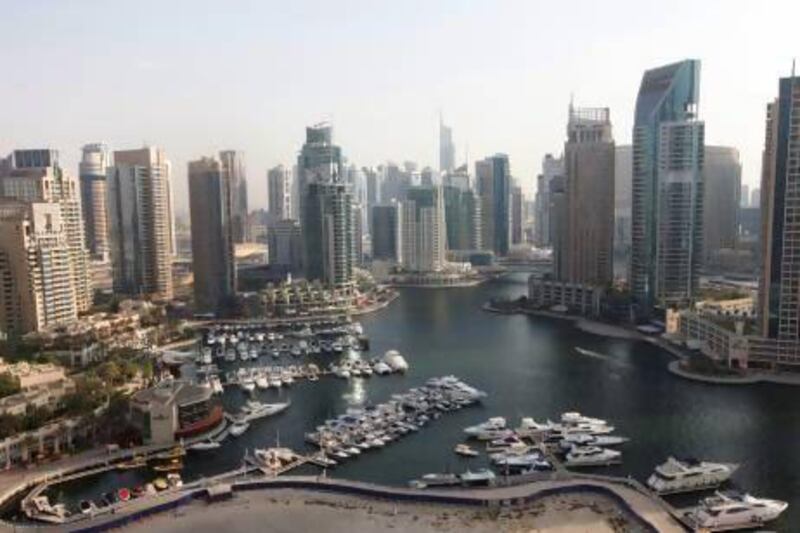In a development that investors will be watching closely, lenders will today be meeting with the Central Bank to discuss its plan to cap mortgage loans.
Last week, a circular was released to banks that restricted borrowing for expatriates to 50 per cent for the first property and 40 per cent for subsequent properties. Emiratis will be able to borrow up to 70 per cent for the first home and 60 per cent for any after.
The regulations have received mixed reviews.
National Bank of Abu Dhabi, the biggest lender in the Emirates with a market capitalisation of Dh39.9 billion, revealed last week that its board along with the Emirates Banking Association plan to meet with the regulator.
"It will be interesting to see the dialogue between the central bank and lenders, and the regulator's point of view on this issue," said Sebastien Henin, a portfolio manager at The National Investor, an investment company in Abu Dhabi.
The cap could hamper the recovery in demand for properties. A measure of that recovery came last month when Dubai unveiled plans to develop the world's biggest hotel and five theme parks.
The 2008 global financial crisis halved UAE home prices.
The central bank has to protect borrowers from volatile markets, Mr Henin said. "What they are doing is right," he said. "It's very good from a fundamental point of view - they are cleaning the bank's books."
He also noted that the mortgage trade "is not the bread and butter for the banks, when you look at the loan breakdown in their portfolios".
Many other analysts have emphasised the cap's effect on borrowers rather than lenders, and warned that the new regulations will hamper property purchases.
"Very few people will be able to buy houses," said Nabil Al Rantisi, the managing director of brokerage at Menacorp, an investment company in Abu Dhabi.
"Controlling speculation can be done in many other ways like not allowing resale of off-plan properties. Usually people who take out a mortgage are not speculators, they are the ones who want to live in a house."
Elsewhere, Oman's stock market has a shot at becoming one of the best-performing bourses among the Arabian Gulf countries this year as the government spends heavily to stimulate economic growth and create jobs.
Oman's stock index edged up just 1.2 per cent last year. It outperformed Qatar and Bahrain, which fell, but lagged far behind Dubai's 19.9 per cent jump, Abu Dhabi's 11.1 per cent rise and Saudi Arabia's 6 per cent gain.
The Omani economy can count this year on strong support from the government: the finance minister, Darwish Al Balushi, last week announced a state budget for this year loaded with job promotion schemes and infrastructure projects.
The budget envisages total state spending of 12.9 billion rials - up nearly 30 per cent from last year's plan, and roughly level with actual expenditure last year, which came in well over budget.
The expansionary fiscal strategy carries risks; unless global oil prices stay above $100 a barrel, Oman may end up posting a budget deficit this year, after enjoying surpluses almost every year in the past decade.
But some of the state money flowing into the economy is expected to boost companies' earnings and then make its way into investors' pockets, creating a positive environment for stocks.
"There will definitely be an impact from the increased budget spending on the market this year," said Adel Nasr, a brokerage manager at United Securities in Muscat.
"I think the banking sector and the industrial sector will both be affected, but mostly, the contractors will benefit. Once the projects start to be announced, you will see an impact on stocks such as Galfar, for example."
Based in Muscat, Galfar Engineering & Contracting is a major construction company that saw its shares rise 0.8 per cent after the budget announcement.
Another stock that could benefit, analysts said, is Bank Muscat, one of the country's biggest lenders; its shares rose 1.1 per cent on Wednesday.
The two companies built on those gains on Thursday, rising respectively by 1.91 per cent and 0.69 per cent.
* With Reuters
Clarification: According to the UAE Central Bank, the new limit on mortgage borrowing for expatriates is 50 per cent for the first property and 40 per cent for subsequent properties, not 60 per cent and 50 per cent as originally stated in this article. This story was amended on January 6 2013.





